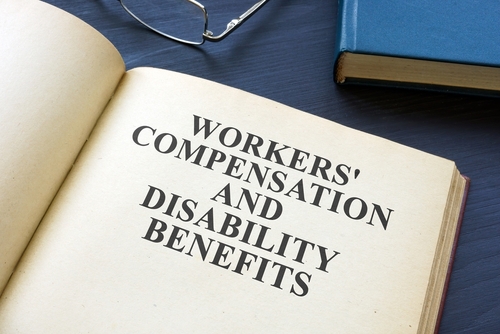Find Expert Guidance on Workers Compensation Disability Types: TTD, TPD, PPD, PTD, and MMI
Navigating the complexities of workers’ compensation can be daunting, especially when dealing with terms like TTD, TPD, PPD, PTD, and MMI. Understanding the different workers compensation disability types and the medical benefits that cover medical costs associated with work-related injuries is crucial for injured workers seeking the compensation they deserve. Our team specializes in Georgia’s workers’ compensation law and is dedicated to helping injured workers understand their rights and benefits. With years of experience in handling workers’ comp cases, we provide clear guidance and support to ensure you receive the compensation you deserve.
Introduction to Workers’ Compensation in Georgia
Workers’ compensation in Georgia can be complex, especially after a work-related injury. Understanding the terms used in this system is essential for injured workers. This guide will clarify key classifications: TTD, TPD, PPD, PTD, and MMI.
Knowing these terms helps you navigate your claim effectively. It ensures you receive the benefits you deserve and understand how they impact your settlement.
Many injured workers feel overwhelmed by the process. However, being informed about workers’ compensation benefits can empower you. It can lead to better outcomes in your case.
This guide aims to simplify the language of workers’ compensation. Let’s break down these important classifications to help you understand your rights and benefits in Georgia.
What These Acronyms — TTD, TPD, PPD, PTD, and MMI Stand For — Quick Overview
Understanding workers’ compensation terms is essential for injured workers in Georgia. The acronyms TTD, TPD, PPD, PTD, and MMI represent different types of benefits and statuses within the workers’ compensation system. Here’s a brief overview of each term:
TTD: Temporary Total Disability
TTD stands for Temporary Total Disability. This classification applies when an injured worker cannot perform any job duties for a limited time due to their injury. While receiving TTD benefits, workers are entitled to two-thirds of their average weekly wage, subject to a maximum cap set by Georgia law. This benefit is designed to provide financial support until the worker can return to their job.
TPD: Temporary Partial Disability
TPD means Temporary Partial Disability. This applies when an injured worker can still perform some work but not at their full capacity. For example, a worker may have restrictions that prevent them from completing all their tasks. TPD benefits provide partial wage replacement, calculated based on the difference between the worker’s pre-injury earnings and their current earnings. This helps support workers as they transition back to full employment.
PPD: Permanent Partial Disability
PPD stands for Permanent Partial Disability. This classification is for workers who sustain permanent injuries but can still perform some work. After reaching Maximum Medical Improvement (MMI), a disability rating is assigned based on the severity of the injury. Georgia has a schedule for body parts that helps determine the compensation amount for PPD. This benefit ensures that workers receive support for their long-term impairments.
PTD: Permanent Total Disability
PTD means Permanent Total Disability. This classification applies when an injured worker is unable to return to any form of work due to their injury. PTD cases are rare and typically involve severe injuries, such as brain injuries or paralysis. Workers eligible for PTD benefits may receive lifetime financial support, reflecting the seriousness of their condition.
MMI: Maximum Medical Improvement
MMI stands for Maximum Medical Improvement. This term indicates that an injured worker’s medical condition has stabilized, and no further improvement is expected with treatment. MMI is a critical point in the workers’ compensation process, as it often determines the next steps regarding benefits and settlements. A medical professional usually assesses whether MMI has been reached, impacting the worker’s eligibility for various benefits.
Understanding these acronyms helps injured workers navigate their rights and benefits under Georgia’s workers’ compensation system. Each term plays a vital role in determining the type and amount of compensation available, making it essential to grasp their meanings.
Understanding Georgia Workers Comp Benefits
Temporary Total Disability (TTD) Benefits
Definition: Can’t Work at All for a Temporary Period
Temporary Total Disability (TTD) benefits, a type of temporary disability benefits, apply when an injured worker cannot perform any job duties due to their work-related injury. This situation often arises after serious accidents or injuries that require time off for recovery. In Georgia, if you are unable to work at all during your recovery period, you may qualify for TTD benefits.
Benefit: ⅔ of Average Weekly Wage (Subject to Cap)
The amount you receive for TTD benefits is two-thirds (⅔) of your average weekly wage before the injury. However, there is a maximum cap on these benefits. This cap is set by the state and can change annually. It is important to keep this in mind, as it may affect the total amount you receive during your recovery.
Duration Limits in Georgia
In Georgia, TTD benefits are not indefinite. You can receive TTD benefits for a maximum of 400 weeks, but this duration may vary based on your specific case and the severity of your injury. If you reach Maximum Medical Improvement (MMI) before the 400 weeks, your benefits may stop.
Understanding these limits is crucial for planning your financial needs during recovery.
TTD benefits play a vital role in ensuring financial support while you cannot work. Being informed about these benefits helps you manage your expectations and plan for your recovery process effectively.
Temporary Partial Disability (TPD) Benefits
Definition: You Can Work, But Not in Full Capacity
Temporary Partial Disability (TPD) benefits apply when an injured worker can still perform some work duties but is unable to work at full capacity. This situation often arises after an injury where the employee can return to a modified job or reduced hours. TPD benefits are essential for helping workers manage their financial needs while they recover.
Benefit: Partial Wage Replacement
In Georgia, TPD benefits provide a partial wage replacement. The amount you receive is typically two-thirds of the difference between your pre-injury average weekly wage and your current earnings. For example, if your average weekly wage was $600 before the injury and you can now earn $400, your TPD benefit would be calculated as follows:
- Calculate the difference: $600 (pre-injury wage) – $400 (current earnings) = $200.
- Determine the benefit: Two-thirds of $200 equals approximately $133.33 per week.
How It’s Calculated in Georgia
Georgia law sets specific guidelines for calculating TPD benefits. The maximum amount you can receive is subject to a cap based on the state’s average weekly wage. It’s important to note that TPD benefits are temporary and will only last until you reach Maximum Medical Improvement (MMI) or until you can return to full work capacity.
Understanding TPD benefits is crucial for injured workers in Georgia. These benefits provide financial support during recovery, allowing you to focus on healing without the added stress of lost income. If you have questions about your eligibility or how TPD benefits apply to your situation, consider consulting a workers’ compensation attorney for guidance.
Permanent Partial Disability (PPD) Benefits
Permanent Partial Disability (PPD) benefits apply to workers who sustain lasting injuries that do not completely prevent them from working. Determining permanent partial disability benefits can be complex and varies across different states, with different approaches such as individual and average justice affecting the calculations. These injuries may limit the worker’s ability to perform certain tasks or may affect their earning capacity. Understanding PPD is crucial for injured workers in Georgia to secure the benefits they deserve.
Definition: Permanent Damage, but Not Totally Disabling
PPD refers to a condition where an injured worker suffers permanent impairment but can still engage in some form of work. This type of disability does not render the worker completely unable to earn a living. Instead, it acknowledges that while the worker may have a reduced capacity to work, they are not entirely incapacitated.
Based on a Disability Rating After MMI
In Georgia, the calculation of PPD benefits relies heavily on the worker’s disability rating, which is determined after reaching Maximum Medical Improvement (MMI). MMI is the point at which a worker’s condition has stabilized, and further medical treatment will not significantly improve their condition. Once MMI is achieved, a physician will evaluate the level of impairment and assign a disability rating, typically expressed as a percentage.
How Georgia’s Schedule of Body Parts Applies
Georgia uses a specific schedule of body parts to calculate PPD benefits. The schedule assigns different values to various body parts based on the severity of the injury and its impact on the worker’s ability to perform their job. For instance, losing a hand may have a higher disability rating than losing a finger. The total PPD benefit amount is then calculated by multiplying the disability rating by the average weekly wage and a set number of weeks determined by the body part affected.
In summary, understanding PPD benefits is essential for injured workers in Georgia. It allows them to recognize their rights and the potential compensation available for permanent injuries that affect their ability to work. If you have questions about your specific situation, consulting with an experienced workers’ compensation attorney can provide clarity and guidance.
Permanent Total Disability (PTD) Benefits
Definition: You’re unable to return to any type of work
Permanent Total Disability (PTD) benefits, also known as permanent total disability benefits, apply when an injured worker cannot return to any form of employment due to their work-related injury. This classification is reserved for severe cases where the injury results in a total inability to work. Examples include catastrophic injuries, such as brain injuries or paralysis, which significantly impair a person’s ability to perform any job duties.
Rare, but available in catastrophic cases
PTD benefits are not common, as most injuries may allow for some form of work, even if it is limited. However, in catastrophic cases, the law recognizes that the injured worker’s condition prevents them from earning a living. This classification ensures that those who are most affected by their injuries receive the support they need.
Lifetime benefits may apply
In Georgia, if you qualify for PTD benefits, you may receive lifetime benefits. This means the injured worker can receive compensation for lost wages for as long as their disability prevents them from working. The amount is typically two-thirds of the worker’s average weekly wage, subject to state caps. Understanding PTD benefits is crucial for workers who face long-term challenges due to their injuries. If you believe you may qualify for PTD benefits, consult a workers’ compensation attorney to explore your options and secure the support you need.
Maximum Medical Improvement (MMI)
Maximum Medical Improvement (MMI) is a critical term in Georgia workers’ compensation. It indicates that your medical condition has stabilized. At this point, further medical treatment is unlikely to significantly improve your condition. Understanding MMI is essential for injured workers navigating their claims.
What it Means: Your Condition Has Stabilized
When you reach MMI, your doctor will determine that your injury or illness is not expected to get better with additional treatment. You may still have some level of impairment, but your condition is considered stable. This means that your recovery process has plateaued.
Why MMI is Crucial in Determining Future Benefits and Settlements
MMI plays a significant role in your workers’ compensation case. Once you reach MMI, your benefits may change. Permanent disability benefits are available to workers who suffer lasting impairments from job-related injuries after reaching MMI. For example, Temporary Total Disability (TTD) benefits will end, and you may transition to Permanent Partial Disability (PPD) benefits based on your impairment rating. Understanding your MMI status helps you plan for future medical needs and financial support.
Who Decides if You’ve Reached MMI
Your treating physician will evaluate your condition to determine if you have reached MMI. They will review your medical history, treatment progress, and current health status. If you disagree with their assessment, you have the right to seek a second opinion. It’s important to ensure that the determination of MMI is accurate, as it directly affects your benefits and potential settlements.
In summary, knowing about MMI is vital for protecting your rights and understanding the next steps in your workers’ compensation claim.
Why These Classifications Matter for Your Workers’ Comp Claim
Understanding the classifications of workers’ compensation benefits is crucial for every injured worker in Georgia. Each category directly influences your compensation and the duration of benefits.
Affects How Much You Receive and for How Long
The type of disability classification, including permanent disability, determines the amount and duration of benefits you receive. For instance, TTD benefits provide two-thirds of your average weekly wage when you cannot work at all. In contrast, TPD benefits offer partial wage replacement if you can work but at a reduced capacity. Knowing these classifications helps you estimate your potential earnings loss and plan accordingly.
Impacts Your Ability to Settle the Case
The classification also plays a significant role in settling your Georgia workers comp benefits case. If you are classified as PPD, for example, the settlement may be based on your disability rating and the specific body part affected. A clear understanding of your classification can enhance your negotiating position when discussing settlements with the insurance company.
How a Workers’ Comp Lawyer Can Protect Your Rights During These Transitions
Navigating the workers’ comp system can be complicated. An experienced workers’ comp lawyer can help clarify these classifications and their implications for your case. They can ensure that you receive the correct classification and benefits you deserve. If you are unsure about your classification, consulting with a lawyer can help protect your rights and maximize your benefits.
In summary, knowing how TTD, TPD, PPD, PTD, and MMI affect your claim is essential. This knowledge not only helps you understand your rights but also empowers you to seek fair compensation for your injuries.
Navigating Workers’ Comp Claims
Navigating a workers’ compensation claim in Georgia involves several key steps. Understanding these steps can help ensure that you receive the benefits you deserve.
Importance of Timely Notification to Employers
The first step in the claims process is to notify your employer about your injury. Georgia law requires that you report your injury within 30 days. Delaying this notification can jeopardize your claim. Prompt reporting allows your employer to initiate the workers’ compensation process and provides you with access to necessary medical care.
Steps Involved in Filing a Workers’ Comp Claim
- Report the Injury: Inform your employer about the injury as soon as possible.
- Seek Medical Attention: Get medical treatment for your injury. It’s essential to follow your doctor’s recommendations and keep records of all medical visits.
- Complete the Claim Form: Your employer will provide a claim form. Fill it out accurately and submit it promptly. If your claim is accepted and you are unable to work due to an injury, you may qualify to receive temporary partial disability benefits.
- Review Your Benefits: Understand the benefits available to you. Knowing what you are entitled to helps you advocate for yourself effectively.
Common Challenges and Disputes in Workers’ Compensation Cases
While filing a claim, you may encounter challenges. Common issues include:
- Claim Denials: Insurance companies may deny claims based on insufficient evidence or pre-existing conditions.
- Disputes Over Benefits: There can be disagreements regarding the type or amount of benefits you should receive.
- Delayed Payments: Sometimes, insurance companies delay payments, impacting your financial situation.
To navigate these challenges, consider consulting with an experienced workers’ compensation attorney. They can help you understand your rights and ensure your claim is handled properly.
How an Experienced Disability Benefits Attorney Can Help
Navigating the workers’ compensation system in Georgia can be challenging. The Law Offices of Humberto Izquierdo, Jr., PC, plays a vital role in managing your claim effectively. With years of experience, we provide expert guidance and advocacy to ensure you receive the compensation and benefits you deserve.
Role of an Attorney in Managing Workers’ Comp Claims
An attorney helps you understand the intricacies of workers’ comp law. They can guide you through each step of the process. This includes filing your claim, gathering necessary documentation, and communicating with your employer’s insurance company. Their expertise ensures that you meet all deadlines and requirements.
Ensuring Fair Calculation and Payment of Disability Benefits
An attorney will review your case to ensure you receive the correct amount of benefits. They understand how TTD, TPD, PPD, PTD, and MMI affect your compensation. They will calculate your average weekly wage accurately, ensuring you receive the full benefits you are entitled to under Georgia law. If there are disputes over your benefits, your attorney will advocate on your behalf.
Protecting the Rights of Injured Employees Under Georgia Law
Injured workers have specific rights under Georgia law. An attorney will protect these rights throughout the claims process. They will make sure you are not taken advantage of by insurance companies. This protection is crucial, especially if your claim is denied or if you face pushback on your benefits.
Understanding These Classifications: Protecting Your Disability Benefits
Understanding the classifications of disability benefits—TTD, TPD, PPD, PTD, and MMI—is essential for protecting your rights. An attorney can clarify these terms and explain how they apply to your situation. This knowledge can significantly impact your benefits and settlement.
Consult a Workers’ Comp Lawyer ASAP
If you are unsure how your injury is classified or if you have questions about your claim, consult a workers’ comp lawyer as soon as possible. They can provide valuable insights and help you navigate the complexities of your case.
Call for a Free Consultation
Don’t hesitate to seek help. Contact The Law Offices of Humberto Izquierdo, Jr., PC for a free consultation to discuss your case. Ensure you are getting everything you are owed under Georgia workers comp benefits. An experienced attorney can make a significant difference in the outcome of your claim (770) 888-8901







